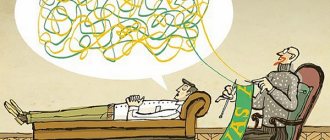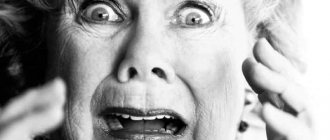What kind of disease is this
To defeat the disease, it is important to know what exactly you have to fight.
Depression is classified as a mental affective disorder that is accompanied by a triad of symptoms: persistent depression of mood, negative mental activity and retardation of movements. If we consider the broader picture, then it is characterized by the following manifestations:
- melancholy, a feeling of hopelessness, loss of faith in a bright future;
- anxiety;
- loss of meaning in life;
- loss of interest in everything, even in things that used to be particularly enjoyable;
- self-blame or blaming others;
- decreased self-esteem, suicidal thoughts;
- insensitivity, decreased emotions;
- decreased thinking abilities;
- impairment of memory, perception;
- inability to plan actions;
- according to the patients themselves, thoughts are distinguished by viscosity and clumsiness;
- any mental attempt is difficult;
- patients spend most of their time in bed;
- stop washing and changing clothes;
- amicable facial expression.
It is very important to correctly interpret such signs, to be able to distinguish depression from ordinary depression or bad mood. Each of us has moments in life when we give up and don’t want to do anything. The main criterion here is the duration of symptoms. If they accompany a person for about 6 months, in this case it is worth thinking about the development of such a disorder.
In any case, you shouldn’t guess on the coffee grounds: it’s better to contact a specialist for qualified help.
How to recognize symptoms of depression
Those close to you are the first to notice deviations in behavior. It would be a mistake to assume that a bad mood is normal for a person who has learned about a terrible diagnosis. But psychologists give only a few weeks for the patient to independently accept his condition. In all other cases, you will need the help of a professional.
The following signs should alert you:
- loss of interest in work, sex, hobbies, and withdrawal from friends and family;
- negative views on life, short temper, whims, excessive criticism in response to any suggestions;
- frequent complaints of headache, indigestion, unexplained fatigue and lack of appetite;
- sleep problems;
- abuse of sleeping pills and painkillers.
Depression is a serious disorder that is included in the international classification of diseases. Do not underestimate the seriousness of the disease. Depression exhausts a person and makes it difficult to concentrate on the recovery process.
Often a person cannot get rid of a disorder through willpower alone. You need to come to terms with the fact that you cannot “cure” someone else’s depression with persuasion.
First of all, you need to tell yourself that you are not to blame for your loved one’s illness and are not responsible for his mood. But no one forbids expressing their love and support.
Why depression develops
One of the common causes of this condition is a traumatic situation: loss of loved ones, dismissal, bankruptcy, change of residence, violence, etc. Depression that appears under the influence of such factors is called reactive. It develops rapidly, but with the passage of time and the absence of a traumatic agent, it passes.
Neurotic depression appears against a background of constant stress, and sometimes it is difficult to name its specific cause. Suspiciousness as a character trait, low self-esteem, and pessimism can become fertile ground.
All these were causes of psychogenic depression. But there is also an endogenous form, that is, when the development of the disorder is provoked by physiological processes:
- disruption of the synthesis of neurotransmitters in the brain that affect a person’s mood, namely dopamine and serotonin;
- hormonal imbalances - childbirth, menopause, puberty;
- some somatic diseases.
Depressive disorder can manifest itself in varying degrees: from mild or erased, to pronounced, with a riot of symptoms. Naturally, treatment will depend on the intensity of the clinical picture.
Diseases are common causes of depression
In fact, any health problems spoil your mood. But news of a serious or incurable illness can undermine self-confidence and deprive one of hope for the future.
In some cases, taking certain medications can lead to the development of depression. Relatives and friends should prepare in advance for complications.
Signs of a depressive disorder are diagnosed in approximately 30% of chronic patients.
Mental illness can increase pain, cause increased fatigue, and general lethargy.
The list of diseases that are most often complicated by depression:
- cancer (risk of developing depressive disorder about 65%);
- Parkinson's disease: 40%;
- multiple sclerosis: 35%;
- stroke: 27%;
- heart attack: 25%.
It is very important that there is always a professional next to the patient, ready to provide moral support. After all, depression often occurs in people left alone with their problems. If it is not possible to be with you around the clock, it is worth hiring a nurse or companion who will provide psychological support.
Pills to fight depression
Antipsychotic medications are one of the most reliable ways to banish negative thoughts. But not all depressed people need them. The question of whether or not to use such drugs in the treatment of a disease is decided only by the doctor. Therefore, the first thing you need to do if you notice depressive symptoms is to consult a specialist.
The most effective antipsychotics are antidepressants. In addition to them, tranquilizers and antipsychotics are also prescribed. These groups of drugs are powerful fighters against depression, but due to their specific action, they require strict control of their use and strict adherence to dosage.
Among other general strengthening agents, nootropics and normatives are prescribed to improve mood. B vitamins help restore the nervous system, and sleeping pills improve the quality of sleep.
Non-drug method
Psychotherapy is another important and effective stage in the fight against depression. Its goal is to influence the patient’s psyche in such a way as to change his false ideas, change his thoughts and correct his behavior.
Individual, group, and family psychotherapy are used to treat depressive disorders.
Based on the tasks performed by psychotherapy, it is divided into:
- supportive - installation of protective reactions of the psyche that can maintain mental balance;
- retraining – teaching new behavior patterns through their approval and criticism;
- reconstructive – understanding the internal conflicts that caused the disorder.
One of the most effective methods of psychotherapy for depression is the cognitive behavioral approach . It allows you to identify distorted interpretations of situations and teaches acceptable models of behavior and self-control.
This type of therapy involves immersing the patient in a negative situation through his own imagination or by actually creating such conditions. Then the patient is taught how to overcome it.
In this case, the psychotherapist uses different methods of influencing the patient. These can be methods of reinforcement: praise or, conversely, remark, reducing susceptibility to fears, explosive therapy - plunging a person into a state of panic fear and helping to find a way out of the situation.
Psychodynamic therapy is also quite effective in this case. Its goal is to resolve conflicts between the unconscious and human consciousness. A different, more positive understanding of what is happening to him comes to him. His thoughts change towards positive thinking.
With the help of this technique, a person is able to recognize emotions, events and feelings repressed from the subconscious. This is done through analytical analysis of dreams, slips and typos, and reflection. The patient manages to reveal the reasons for his condition, which were laid down in childhood. As a result of such work, the true “culprits” of the disorder located in the subconscious come out. The patient is aware of them and seeks ways to resolve them.
The founder of psychodynamic therapy is Sigmund Freud, who, by the way, himself suffered from depression.
Existential therapy . Proponents of this method argue that the cause of depression is an existential vacuum. It is formed when a person is in a state of alienation and loneliness. Such feelings appear when the patient loses contact with society. At the same time, he tries to escape reality, plunging into his unreal world.
This therapy is aimed at developing the patient’s self-respect, adequate self-perception, and search for the meaning of existence. The method uses interesting methods of influence aimed at performing actions that are embarrassing and frightening for the patient. They allow him to get out of his comfort zone, helping him reconsider his values, behavior, and restructure his thinking.
It is impossible to force someone to get professional help.
No matter how much one would like to force a patient with depression to see a psychologist, doing something against the person’s will is prohibited. Until the patient himself decides to undergo treatment, no specialist will be able to help.
Awareness of the problem and a sincere desire to get rid of the manifestations of depression is the first step towards recovery.
A depressed person truly believes that his situation is hopeless and treatment is pointless. The main task of relatives is to show that the problem can be solved. Some people resort to tricks and invite a psychologist home in the form of a “distant acquaintance.”
You may also be offered a general screening at the hospital. Among the specialists who conduct the examination may be a psychotherapist. During the general examination, possible causes of depression associated with taking certain groups of medications will also be excluded.
Sometimes people who hear an official diagnosis of “depressive disorder” agree to treatment more quickly. After all, the doctor’s opinion is more significant than the guesses of relatives and friends.
You can also accompany a loved one to their first appointment with a psychotherapist. Feeling supported is extremely important. Although some people, on the contrary, prefer to communicate with specialists secretly from others.
Sport is the best antidepressant
Depressed people have significantly elevated levels of adrenaline and cortisol. These hormones not only provoke the development of stress, but also have a detrimental effect on health. They can provoke circulatory disorders and heart diseases, kidney problems, digestion and other unpleasant consequences.
Physical exercise acts as a counterbalance to the above processes. They promote the production of endorphins - the well-known hormones of happiness, help relieve fatigue, fight stress, charge the body with energy, and increase tone. As a bonus, you get a beautiful, toned body.
Sport improves blood circulation, including in the brain. Increased cerebral circulation promotes clarity of thoughts. After training, you will no longer want to burden yourself with a negative attitude.
By the way, a number of studies were conducted in Ireland that found that strength training has the greatest success in the fight against depression. Their combination with drug therapy significantly accelerates the result. Of course, in such a depressed state it can be very difficult to pull yourself together. Well, excuse me, no one will do this for you! Tune in and start taking action if you want to get out of a state of dejection. The main thing is to start!
If it is difficult to start strength training right away (perhaps your health condition does not allow you to do this), start simply with morning exercises - ten minutes to start. Gradually increase this time. A light jog or just a walk in the park is perfect.
If you don't like strength or cardio exercises, take up Eastern techniques. In the East, sages believed that depression occurs due to energy imbalance. To restore it, use practices that help focus attention and energy on yourself and your body. Yoga is great for this. It is based on a specific breathing system, which helps to maximally saturate the body with oxygen and charge it with vigor. Add various types of meditation and mantra chanting to yoga.
Meditation is another way to stabilize your mental state and improve your mood. It has been laboratory proven that it activates alpha waves, which trigger brain function, allowing you to relax and find calm.
Many people do not believe in the effectiveness of meditative practices, believing that they will not solve their pressing problems: they will not attract happiness, abundance and other resources into their lives. Undoubtedly, with the help of meditation you will not get a bank account, but it will allow you to change your thinking and create psychological comfort. And then you will probably find ways to solve your problems on your own.
Other ways to combat depression
Here are other options that will tell you how to cure depression yourself.
- Journey. A change of environment will allow you to get new impressions and take your mind off bad thoughts. The famous and beloved actor Brad Pitt, at the dawn of his popularity, faced a condition such as depression. He did not know and did not understand what to do with his fame, how to behave. This fear led him to turn to marijuana and alcohol. He avoided people and tried to drown out his fear with food. A trip to Morocco brought him out of this impasse, where he managed to abstract himself from harmful thoughts and rediscover himself.
- Communication. If you feel sad and sad at heart, go “to people.” Communication with friends and loved ones will lift your spirits and give you inspiration. Or just visit a crowded place: a park, theater, exhibition, zoo. Receive positive emotions and interesting information. Avoid loneliness.
- Sleep is the best medicine. A well-known, and most importantly, true saying: in sleep, not only the body, but also the thoughts rest. It helps you relax and not think about depressing situations.
- A good option to switch attention from the negative is to find something you like. It could be anything: culinary practice, handicrafts, learning foreign languages, creativity. Every person is able to choose what interests him.
- Or just read a good, interesting book. Perhaps you have a favorite work or author. In case of depressive thoughts, it is recommended to resort to literature that promotes positive thinking. The go-to option if nothing comes to mind is Dale Carnegie’s books. You can glean a lot of useful, positive, developmental information from them.
- Take a contrast shower. The temperature difference is a great shake-up for the body. Makes you wake up from hibernation.
Here is an unexpected method for getting rid of depression, which may amaze you with its simplicity. But it is so effective that once you start using it, you will definitely feel better.
So, it's simple. Regular gratitude is a great antidote to depression. Thank each and everyone for every little thing that has positively impacted you in one way or another. Thank the Universe for the things you already have. Every day, look for something in your life for which you can express simple, sincere gratitude.
What to do if a person is depressed
Sometimes a person denies that they have a mental disorder. In response to offers of help, he may become angry and offended.
If you don't know where to start, try listening to complaints first rather than giving advice. You don’t need to set yourself the goal of “putting your friend or family member on the right path.” A simple conversation will show the person that no one is judging their feelings and there is nothing wrong with asking for help.
Don't expect the problem to be resolved in one conversation. Depressed people tend to introspect, so you need to be willing to listen again and again.
Psychologists recommend starting a conversation with neutral phrases:
- “I've been worrying about you lately”;
- “I recently noticed changes in your mood and wondered about the reasons”;
- “I wanted to talk to you because you seem down lately.”
If a person has not expressed obvious displeasure and has shown a readiness for dialogue, you can continue the conversation with the phrases: “How long ago did you start feeling depressed?”, “How can I support you?”, “What do you think about the help of a psychologist?” Remember that support should give hope, and not burden the patient with even more problems.
A list of phrases that can really help a person with depression:
- "You are not alone. I will go through this difficult stage with you”;
- “It may be hard to believe now, but your health will definitely improve”;
- “Please call me if you feel that your condition has worsened”;
- “Even if I can’t understand how you feel, I will try to help”;
- "You are important to me."
If you don’t know what to do if a person is depressed, then it’s better to avoid intimate conversations altogether.
There are phrases that only make the situation worse:
- “The problem is only in your head”;
- “Everyone has hard times”;
- “Try to find the bright side in this situation”;
- “Just do something useful”;
- “At least pretend that you feel better, and your mood will automatically improve.”
It can be difficult to believe that someone you have known and loved for so long could be contemplating suicide. But depressive disorders are very often fatal. Depression clouds the mind, distorts real facts, and makes a rational person think that death is the only way to end mental and physical pain.
What are you thinking about
Your thoughts are an important tool in the emergence of “black melancholy”. Here are a few destructive ideas that swarm in the brains of depressed individuals:
- I have depression because I am an unbalanced, impressionable and sensitive person. In fact, these are empty excuses for unwillingness to work on oneself;
- someone or something is to blame for your condition. Bad job, lack of money, marital misunderstandings - all kinds of tricks the psyche will go to in order to justify the current situation. In general, depression can distort the real essence of things. She exaggerates the negative aspects, focuses attention on them, exaggerates minor problems and shortcomings. Because of this, life is perceived as a swamp, a quagmire, one continuous suffering. A person must realize that the cause of his condition lies within himself, and not in external objects. By changing your thinking, you transform your life;
- decreased self-esteem. Perception of oneself as a useless person, incapable of anything;
- the opinion that people around them treat a person negatively, with hostility;
- lack of hope for a positive future, concentration on negative outcomes and defeats.
It is important to control your thoughts. In principle, this should be done not only in a state of depression, but in general. Try to look for the positive in everything. This may be difficult to do at first. Concentrate all your attention on this. And protect yourself from negative information, be it conversations or TV programs.
Analyze the situations that caused your current state, whether they are so deplorable. Don't judge yourself or scold yourself. Share your thoughts with loved ones, ask for advice.
Signs of depression in women
Doctors distinguish between major and minor symptoms of depression. The first group includes decreased energy, worsening mood, and the inability to enjoy things that always brought joy before.
Against this background, other signs may appear. A woman may notice that she is unable to concentrate on a conversation or remember important information. Self-esteem decreases, thoughts of personal or professional failure arise. Ideas of guilt may arise in relation to someone close to you, and life seems lost and hopeless.
Relatives may also notice changes in the behavior of the mother and spouse. A symptom of depression is loss of appetite when a woman refuses to eat or, conversely, begins to eat too much. Sleep and its quality are disturbed: insomnia causes difficulty waking up in the morning, and lethargy and apathy plague you throughout the day. There is a strong decline in relationships with a partner: sexual desire is lost, and in moments of intimacy the woman does not experience pleasure.
“The symptoms of depression in women after 30, 40, 50 years are the same,” says psychiatrist Christina Wirth. “Only the thoughts that come during depression change.”
pixabay.com/
What is depression afraid of?
Willpower is what can help you overcome a disorder and never return to it again.
It should be immediately noted that this quality does not appear suddenly, out of nowhere. It needs to be developed and cultivated step by step. Of course, it is more convenient and comfortable for our psyche to lie in bed, laze around, looking at the ceiling. But you must understand that laziness, negativism, powerlessness are excellent fertile soil for cultivating depressive ideas. And even antidepressants, without your efforts, will turn out to be the remedy that can only lift you out of despondency for a short period of time: after you stop taking them, everything comes back again.
Know: depression does not like efficient, positive, active individuals. Learn to counteract your fears, laziness, and despondency. If you want to lie down and mope, get up and start doing something: anything, even just wash the dishes. If you want to complain about a difficult fate, instead, say something positive or interesting, give a compliment to your interlocutor.
Work on yourself, even if it is difficult at first. And get results!
Eat right
Did you know that there are products with antidepressant effects? If you take them regularly, it will lift your mood and get out of a depressing state.
- Banana. The fruit contains the alkaloid harman, which can literally cause a feeling of bliss. One fruit a day is enough to get pleasure.
- Any vegetables or fruits in yellow and orange colors - carrots, oranges, grapefruits, persimmons.
- Chocolate is the first, main antidepressant. It contains phenylethylamine, which is involved in the synthesis of endorphins, and magnesium, which stimulates the nervous system.
- Honey. An excellent natural product that promotes relaxation and enriches our body with nutrients. Recommended dose – 1 tsp. 3 times a day.
- Dried fruits, nuts. Simply useful!
- Oatmeal. Her secret to a good mood is thiamine, the “vitamin of optimism.” Magnesium secures the result.
- Chilli. Capsacin in its composition suppresses pain and improves tone. In addition, burning sensations will help you switch your attention and occupy your thoughts with other concerns.
- Salmon. This fish is rich in vitamin D as well as omega-3 fatty acids. These components are excellent helpers in the fight against depression.
- Cheese. It contains many amino acids that are necessary for the functioning of the entire body as a whole. Roquefort cheese is the most dangerous for depression.
- Coffee. A tonic, invigorating drink. Gives strength and energy. Allows you to enjoy the pleasant aroma and rich taste.
Eliminate fried, fatty, smoked foods from your diet. Try to eat only healthy foods.
Drink soothing, warm herbal infusions. Use the following herbs to prepare them:
- St. John's wort;
- ginseng;
- mint, lemon balm;
- hawthorn;
- rosemary;
- Aralia.
Herbal teas relieve stress and help you relax. They improve the quality and duration of sleep, eliminating insomnia.
Natural, high-quality products can bring into your life the pleasure that you are missing. A good dish lifts your spirits, and preparing it will allow you to spend your time profitably.
Medicines to treat depression
The choice of medications is determined by the degree of depressive disorder. For treatment on an outpatient basis and for mild cases of the disorder, selective serotonin reuptake inhibitors or two neurotransmitters at once are used: serotonin and norepinephrine.
To understand the principle of their action, you need to delve a little deeper into the anatomy. From school years we remember that nerve cells, called neurons, have processes. Along these processes, nerve impulses are transmitted from one neuron to another, and along with them, neurotransmitters, for example, serotonin or norepinephrine, are transferred.
When everything is in order with the production of neurotransmitters, the nervous system has enough of these substances to trigger bioelectric reactions. And they, in turn, are needed for healthy emotions, energy and well-being. When there are not enough substances, one of the processes natural to a healthy body begins to harm. The fact is that neurons do not use neurotransmitters to their full potential. Often, serotonin, which “settles” on a neighboring cell, does not have time to be used and, with the help of a special protein, is returned back to the parent cell and destroyed.
Drugs used in psychiatry to treat depression from the group of selective serotonin or norepinephrine reuptake inhibitors block the very protein that sends neurotransmitters “for disposal.” Thanks to this, the concentration of neurotransmitters in the intercellular space increases, they become more or less sufficient for the functioning of the nervous system, which improves the patient’s well-being.
pixabay.com/
“More complex antidepressant drugs block an enzyme that destroys neurotransmitters,” says psychiatrist Christina Wirth. “But they also have more side effects, so they are not used for mild depression. Drugs from the group of selective serotonin reuptake inhibitors are recognized as the gold standard of modern treatment of mental disorders.”
But it happens that these medications do not help. Then the doctor may decide to prescribe other drugs. For example, mood stabilizers, which are called “mood stabilizers,” or antipsychotic drugs in small doses, which are used in the treatment of schizophrenic disorders and hallucinations. It is important to understand that the choice of medication depends on the patient’s condition, and if it is possible not to use “heavy artillery,” the doctor will not prescribe such drugs.
“Antidepressants have side effects,” continues Christina Wirth. - They affect the body as a whole. Drowsiness or, conversely, agitation may develop. The patient may be bothered by nausea, dry mouth, menstrual irregularities, even allergic reactions. But drugs from the group of selective serotonin reuptake inhibitors are the safest and best tolerated.”
The disadvantage of these funds can be considered prolonged action. They have a cumulative effect and begin to work no earlier than after 2-6 weeks. The World Health Organization recommends taking them for six months. If the condition improves, after 6 months the doctor may decide to complete the course of medication.










